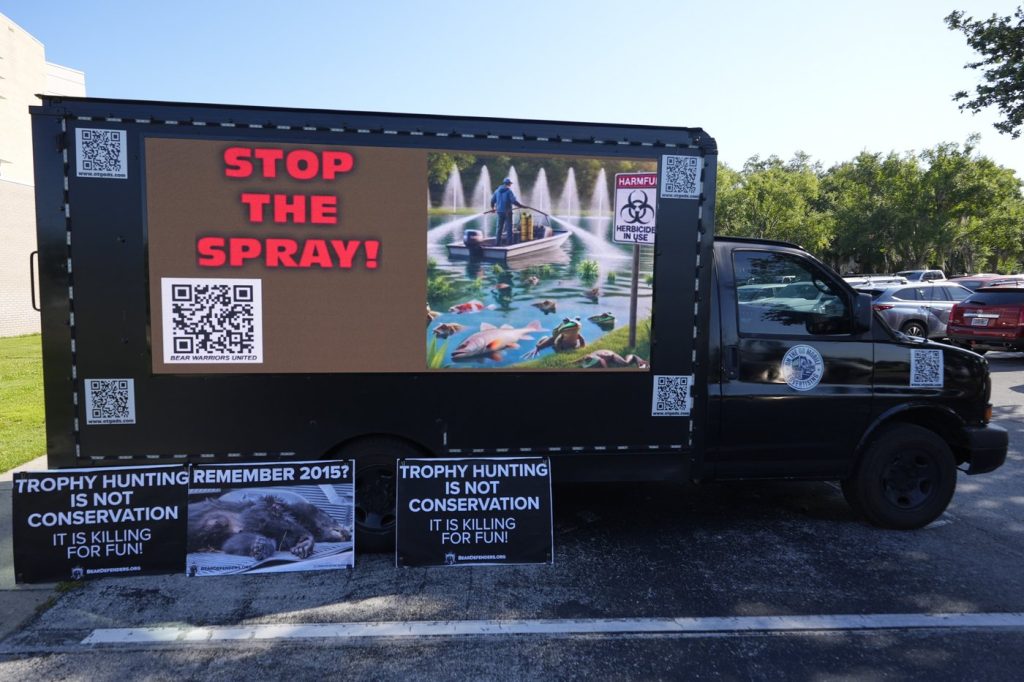ST. PETERSBURG, Fla. (AP) — Ten years after a contentious black bear hunt in Florida that resulted in the deaths of over 300 bears in just two days, the Florida Fish and Wildlife Conservation Commission (FWC) is once again considering a bear hunting season. This potential hunt, which could take place in December 2025, is met with significant opposition, reigniting the debate over wildlife management in the state.
The FWC convened in Ocala to discuss the proposed bear hunt, potentially allowing the use of up to six dogs to track the bears. Proposed methods may include bowhunting, similar to regulations for deer hunting, and hunting in areas where bait is used to attract bears. The commission argues that a bear hunt is necessary to manage the population growth of black bears, which currently number around 4,000 in Florida. They emphasize that population management is essential for balancing species numbers with suitable habitat and maintaining a healthy ecosystem.
Marion County Sheriff Billy Woods, whose county has seen a rise in bear-human encounters, expressed support for the hunt, stating that it should be regulated to ensure the safety of residents. Woods reported 107 bear encounters in the past nine months, likely an underrepresentation due to unreported incidents in rural areas. He believes that regulating a bear hunt would enhance public safety for Florida's residents.
Advocates for the hunt, including hunters and representatives from outdoor organizations, point out that Florida is one of only six states with significant black bear populations that currently prohibits hunting. They argue that regulating bear hunting is crucial for responsible wildlife management. Travis Thompson, executive director of the All Florida conservation organization, stated, “Bear is a game species. It’s time for us to have some level of bear hunt.”
Opponents, however, argue that there is insufficient scientific evidence to justify a bear hunt and advocate for alternative measures, such as securing trash and other non-lethal methods to prevent human-bear conflicts. Leslie Carlile, a long-time Florida resident and an opponent of the hunt, declared, “I implore you to not allow the slaughter of these majestic animals we have in Florida. Trophy hunting is pure evil in my opinion.”
To date, the FWC has received over 13,000 public comments regarding the proposed hunt, with approximately three-quarters opposed to the idea. At the Ocala meeting, 170 individuals signed up to voice their opinions on the proposal, with many urging against the hunt. Opponent Janet Osborne argued that the real issue is not bear overpopulation but rather the rise in human population in Florida.
Among the incidents cited by hunt supporters is a rare fatal attack by a black bear on an 89-year-old man, Robert Markel, and his dog in Collier County earlier this month. Additionally, bears have been spotted frequently in urban areas extending into their natural habitats, even wandering into places like Disney World's Magic Kingdom in 2023.
The previous black bear hunt in 2015 was marred by chaos, leading to its early termination. During that hunt, over 300 bears were killed, including at least 38 females with cubs, resulting in further fatalities among the cubs. This time, the proposed plan includes a lottery system for permits with a limit of 187 hunters. Permits will cost $100 for Florida residents and $300 for non-residents, with regulations in place to prohibit the hunting of cubs and females with cubs.
FWC anticipates scheduling the 2025 bear hunt from December 6 to December 28. Moving forward, the commission plans to hold bear hunts between October 1 and December 31, contingent upon further studies about the impacts of hunting and the bear population. Additionally, private landowners with at least 5,000 acres could initiate a “bear harvest program” on their properties where bears could be hunted at bait feeding stations.











